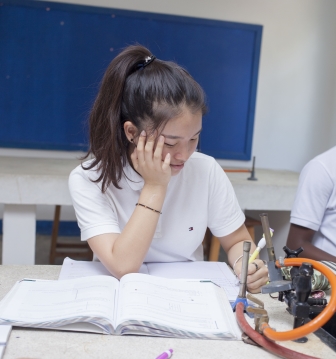Curriculum
Overview
Dar es Salaam Independent School focus on supporting and developing our students to reach their full potential and on preparing them for the challenges of further education.In Year 9, students sit for the Checkpoint, the diagnostic tests for English, Maths and Science, ICT and Global.
Built on the broad and balanced study in lower secondary, students hone their competencies in their chosen subjects in a learner-centred environment that supports enquiry based learning, to acquire the internationally recognized Cambridge IGCSE qualification at the end of Year 11.

Subjects offered
Cambridge Upper Secondary IGCSE
- Economics
- Business Studies
- Art & Design
- Kiswahili ( as Second Language / Foreign language)
- History
- Geography
- Literature
Cambridge Lower Secondary
Cambridge Lower Secondary English is designed for learners who have English as a first language and can be used in any cultural context.
English promotes an enquiry-based approach, developing learners’ confidence, creativity and intellectual engagement. Learners develop English skills they can apply for a range of different purposes and audiences in everyday situations and in study. They will communicate confidently and effectively and develop the critical skills to respond to a range of information, media and texts with understanding and enjoyment.
Cambridge Lower Secondary Mathematics focuses on principles, patterns, systems, functions and relationships so that learners can apply their mathematical knowledge and develop a holistic understanding of the subject. The Cambridge Lower Secondary Mathematics curriculum framework continues the journey from Cambridge Primary Mathematics and provides a solid foundation upon which the later stages of education can be built.
The Cambridge Lower Secondary Mathematics curriculum is presented in six content areas: Number, Algebra, Geometry, Measure, Handling data and Problem solving. The first five content areas are underpinned by Problem solving. This sixth strand provides a structure for the application of mathematical skills.
Cambridge Lower Secondary Science supports learners in developing life-long curiosity about the natural world and enables them to seek scientific explanations to the phenomena around them.
Learners develop a range of scientific skills, through Working Scientifically, alongside developing their scientific knowledge and understanding, through the strands of Biology, Chemistry and Physics.
Cambridge Global Perspectives is a unique, transformational programme that helps lower secondary learners to develop transferable skills such as critical thinking and problem solving. It offers valuable opportunities to reinforce links with and skills learnt in other subjects across the Cambridge Lower Secondary programme.
The emphasis is on developing learners’ ability to think critically about a range of global issues where there is always more than one point of view. Learners study global topics that are relevant to them – for example, the environment, education and keeping healthy.
Research says that the earlier learners start to develop and practise their skills, the greater the impact on their learning. Making Cambridge Global Perspectives available to younger learners will develop and embed cross-curricular skills at an earlier age, supporting them in their studies as they progress to Cambridge Upper Secondary and beyond.
This course enables learners to become accomplished, safe and responsible users of digital technology across a variety of devices. It prepares learners for the future by helping them to identify future risks and opportunities and to understand the speed at which technology, and its applications, is changing.
Digital Literacy helps learners develop the skills to produce digital artefacts efficiently and creatively. They will learn how to engage in online spaces safely and to make effective choices about the information that they find online. They will also understand the disruptive nature of digital technologies and become equipped to asses the positive and negative impacts that this disruption is having on individuals, communities and whole industries.
Information and Communications Technology (ICT) is now part of the educational experience worldwide and compentency in certain software types, such as those that are used for creating text documents, is regarded as a key skill for learners of all ages.
Cambridge ICT Starters contains a series of assessed modules which allow learners to demonstrate their ability to use a range of computer software to communicate, search for and handle information, and to program solutions.
This wide ranging discipline enables learners to explore their creativity and to express themselves through a range of artistic forms. They will experiment with artistic media, seek their own artistic experiences, consider the artistic process that all artists follow and will use these to express their creative ideas and their experiments, through both personal and collaborative pieces of art. Throughout their artistic journey, learners will also learn the benefits of reflecting on their own experiences, the work of other artists, the experiences of other learners and from the diverse contexts from which art has evolved.
Cambridge Lower Secondary Music fosters creativity and builds confidence. It helps learners develop a deeper understanding of self-expression, and shows them the importance of communication as they learn to connect with other musicians and audiences. This curriculum emphasises musical exploration and gives learners the opportunity to both make music and make sense of music at every stage of development. The focus is on experimentation and responding to music which leads to an increasing awareness of self and personal musicality.
Cambridge Lower Secondary Music fosters creativity and builds confidence. It helps learners develop a deeper understanding of self-expression, and shows them the importance of communication as they learn to connect with other musicians and audiences. This curriculum emphasises musical exploration and gives learners the opportunity to both make music and make sense of music at every stage of development. The focus is on experimentation and responding to music which leads to an increasing awareness of self and personal musicality.
Our curriculum is flexible so you can combine music from your local context with those from other cultures. Learners will experiment and contribute as they follow a wide variety of musical paths, helping to develop an affinity to music as well as find ways to express their unique musical personality.